|
|
|
Sort Order |
|
|
|
Items / Page
|
|
|
|
|
|
|
| Srl | Item |
| 1 |
ID:
130613
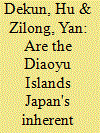

|
|
|
|
|
| Publication |
2014.
|
| Summary/Abstract |
"Historians believe that historical essays have nothing to do with the science of history and are actually harmful. Indeed, authors of such essays, whether intentionally or unintentionally, leave traces of themselves and their time. The same is true of editorials and reviews found in today's newspapers." ' The Origins of the Japan-China Territorial Issue, a new book by Mr. Murata Tadayoshi, an honorary professor at Japan' s Yokohama National University is also an example of what the Contemporary Historian, Mr. Chen Yinke, was referring to in the above. It is common knowledge that after Japan's Noda cabinet adopted its "nationalization" policy over the Diaoyu Islands on September ll, 2012, the Sino-Japan relationship began a downward spiral, while rivalry between non-govemment groups from both nations escalated. The Diaoyu
Islands dispute has become a hot topic for both the media and academia. Among the many works on the topic, Professor Murata's is quite unusual. While tensions remain high between China and Japan, his book carries an impressive argument as shown by work's subtitle-FaZsz?ed Facts in Japanese Government Papers. The cover of the book also features the question--"Are the Diaoyu Islands an inherent part of Japan's territory?"
|
|
|
|
|
|
|
|
|
|
|
|
|
|
|
|
| 2 |
ID:
131995


|
|
|
|
|
| Publication |
2014.
|
| Summary/Abstract |
Within the scholarly debate on the current power transition in the international system, particular importance is attached to China's economic rise and the global shifts it is bringing forth in material primacy. A thorough understanding of these shifts in the relative distribution of power, however, requires leaving the narrow path of material capabilities and looking at normative accounts as well. Taking up this challenge, the article focuses on the political dimension of China's rise by exploring the country's alignment with South American governments along two dimensions: the convergence of their foreign policy ideas and the provision of diplomatic links facilitating their cooperation and coordination in global politics. The empirical analysis depicts a nascent global agenda forming between China and certain South American countries and shows that, along with growing levels of foreign policy compatibility, China has also advanced its diplomatic inroads into the region, particularly at the level of bilateral relations. Taking these developments as a whole, it is suggested that China has gained international attraction in terms of its visions of global order and as a potential political partner throughout the region. The article concludes with a discussion of the findings in light of the ongoing relative shifts in the distribution of global power beyond material primacy, and the prospects for China's further political rise.
|
|
|
|
|
|
|
|
|
|
|
|
|
|
|
|
| 3 |
ID:
131634
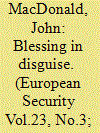

|
|
|
|
|
| Publication |
2014.
|
| Summary/Abstract |
This article examines the implications of Scottish independence for the UK's nuclear posture. It is argued here that a vote for independence will critically undermine this posture. Since the UK nuclear force operates entirely out of Scotland, and since the Scottish government continues to assert its intention to see nuclear weapons removed from an independent Scotland, it is overwhelmingly likely that a 'Yes' vote will prompt a demand for the drawdown of the UK nuclear force in Scotland. If it wished to maintain its nuclear capability, the UK government would then have to make alternative basing arrangements. It is argued here that a host of legal, financial and political difficulties may preclude any such relocation and that Downing Street may ultimately be left with little option but to surrender the UK's nuclear capability. This article concludes that far from weakening the UK, a surrendering of its nuclear posture would result in a stronger and more functional UK military footprint and would bolster the UK's standing in the international arena.
|
|
|
|
|
|
|
|
|
|
|
|
|
|
|
|
| 4 |
ID:
129532
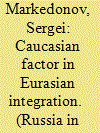

|
|
|
|
|
| Publication |
2014.
|
| Summary/Abstract |
Moscow has made the largest progress in Eurasian integration with Armenia. It has had no integration plans (given numerous constraints) with regard to Azerbaijan or Georgia. Yet Russia's victory cannot be regarded complete or unequivocal. Eurasian integration is one of Russia's key foreign policy priorities at present, viewed as an instrument to bolster its influence in the international arena. As President Vladimir Putin said, "We propose a model of a powerful, supranational union, capable of becoming one of the poles of the modern world and playing an effective role in linking Europe to the thriving Asia-Pacific region."
Prospects for a major reconfiguration of the post-Soviet space emerged after the Customs Union agreement became effective in July 2010. It was followed by three-and-half-years efforts by Russia and its closest partners Belarus and Kazakhstan to institutionalize the Eurasian integration project, which opened the possibility of other former Soviet republics joining the core "union of three
|
|
|
|
|
|
|
|
|
|
|
|
|
|
|
|
| 5 |
ID:
130999


|
|
|
|
|
| Publication |
2014.
|
| Summary/Abstract |
We examine the degree to which national political setting, namely domestic political opportunity structures, influences the transnational activities of women's groups in the United Kingdom, France, and Germany. The literature suggests that social groups are more likely to choose international activity when national institutions provide fewer opportunities for domestic activity (Keck and Sikkink 1998; della Porta and Tarrow 2005). Using data about women's groups' activity from a content analysis of news wires from 1980 to 2008, we conclude that women's groups act in the domestic sphere significantly more than they act in the international arena-even when acting on transnational issues-and that groups choose international action when domestic opportunities are less hospitable to group action. Thus, we argue that the domestic sphere continues to be a major influence on social movement activity even as globalization and transnationalism increase.
|
|
|
|
|
|
|
|
|
|
|
|
|
|
|
|
| 6 |
ID:
131008
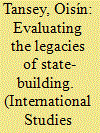

|
|
|
|
|
| Publication |
2014.
|
| Summary/Abstract |
What impact do international state-building missions have on the domestic politics of states they seek to build, and how can we measure this impact with confidence? This article seeks to address these questions and challenge some existing approaches that often appear to assume that state-builders leave lasting legacies rather than demonstrating such influence with the use of carefully chosen empirical evidence. Too often, domestic conditions that follow in the wake of international state-building are assumed to follow as a result of international intervention, usually due to insufficient attention to the causal processes that link international actions to domestic outcomes. The article calls for greater appreciation of the methodological challenges to establishing causal inferences regarding the legacies of state-building and identifies three qualitative methodological strategies-process tracing, counterfactual analysis, and the use of control cases-that can be used to improve confidence in causal claims about state-building legacies. The article concludes with a case study of international state-building in East Timor, highlighting several flaws of existing evaluations of the United Nations' role in East Timor and identifying the critical role that domestic actors play even in the context of authoritative international intervention.
|
|
|
|
|
|
|
|
|
|
|
|
|
|
|
|
| 7 |
ID:
131635


|
|
|
|
|
| Publication |
2014.
|
| Summary/Abstract |
This article examines how the governance of justice and internal security in Scotland could be affected by the outcome of the Scottish independence referendum in September 2014. The article argues that it is currently impossible to equate a specific result in the referendum with a given outcome for the governance of justice and internal security in Scotland. This is because of the complexities of the current arrangements in that policy area and the existence of several changes that presently affect them and are outside the control of the government and of the people of Scotland. This article also identifies an important paradox. In the policy domain of justice and internal security, a 'no' vote could, in a specific set of circumstances, actually lead to more changes than a victory of the 'yes' camp.
|
|
|
|
|
|
|
|
|
|
|
|
|
|
|
|
| 8 |
ID:
137637


|
|
|
|
|
| Summary/Abstract |
There are a wide range of roles and effects that justice can have in negotiations at the international level. It can be a source of conflict and trigger for negotiation, a referent guiding negotiations, a subject of negotiation, a tool to reach effective agreements, and a tactical tool. Justice can assume any or several of these roles in any one negotiation. This article looks at justice as a lens through which to understand what drives negotiation processes and explains different results in the international arena.
|
|
|
|
|
|
|
|
|
|
|
|
|
|
|
|
| 9 |
ID:
131000
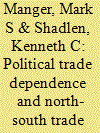

|
|
|
|
|
| Publication |
2014.
|
| Summary/Abstract |
Why do developing countries negotiate North-South trade agreements, when they already enjoy preferential market access to developed-country markets? Most developing countries benefit from the generalized system of preferences (GSP) and related schemes when they export to the United States, the EU, and other developed economies. And yet, many pursue fully reciprocal agreements that require major concessions to the developed partner. We argue that this is due to the nature of the GSP as a unilateral concession that can be (and often is) taken away. High dependence on unilateral, removable preferences generates "political trade dependence" (PTD). We distinguish PTD from standard measures of trade dependence, and we explain why PTD motivates developing countries to seek North-South Regional Trade Agreements (RTAs). We show the effects of PTD with a selection of illustrative cases and test our hypothesis on a data set of EU and US trade agreements with developing countries. We find robust statistical support for our hypothesis that high and rising levels of PTD make the negotiation of a North-South RTA more likely.
|
|
|
|
|
|
|
|
|
|
|
|
|
|
|
|
| 10 |
ID:
130196


|
|
|
|
|
| Publication |
2014.
|
| Summary/Abstract |
The year 2013 in Taiwan was marked by a lackluster economy and stalemated politics. President Ma Ying-jeou's approval rating hit an all-time low. Still, Taiwan's relations with China were smooth, and Taiwan was able to make some gains in the international arena.
|
|
|
|
|
|
|
|
|
|
|
|
|
|
|
|
| 11 |
ID:
126176


|
|
|
|
|
| Publication |
2013.
|
| Summary/Abstract |
Pakistan remains a perennial problem for us. It is a unique situation in which the animosity of 65 years has not been overcome despite vast changes in the international arena, with former implacable adversaries like the US and Russia moving, despite serious differences, towards fundamental reconciliation. It is not surprising, therefore, if the last decade has not produced normalisation of relations between the two countries.
|
|
|
|
|
|
|
|
|
|
|
|
|
|
|
|
| 12 |
ID:
124740


|
|
|
|
|
| Publication |
2013.
|
| Summary/Abstract |
Japan's foreign and defence policy is changing in response to new developments in the regional security environment and in the wider international arena. As Tokyo looks to strengthen its relationship with Western partners and especially NATO, the EU and their member states, the UK appears a natural choice both in itself and as a link to Europe. Michito Tsuruoka analyses the many strategic considerations driving Japan's efforts to build stronger partnerships in the defence and security field and explores what the UK can do to strengthen its engagement in Asia.
|
|
|
|
|
|
|
|
|
|
|
|
|
|
|
|
| 13 |
ID:
126727
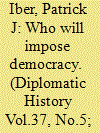

|
|
|
|
|
| Publication |
2013.
|
| Summary/Abstract |
This article examines the life of Sacha Volman (1923-2001), a Romanian exile who became a key conduit for CIA support to Latin America's anticommunist left during the Cold War. It traces the evolution of the front groups that underwrote his activities, his involvement with institutes for political training and the production of propaganda in Mexico and Costa Rica, and, most importantly, his organizing in support of the short-lived presidency of Juan Bosch (1963) in the Dominican Republic. The article argues that, contrary to traditional accounts, the Cold War environment and the actions of the United States provided certain opportunities for the political left in the region-provided, of course, that it was an anticommunist left. Yet CIA support was a weak form of commitment on the part of the United States. In the end, Volman's ally Bosch was overthrown and President Johnson sent troops to prevent him from being restored to power, while much of the propaganda produced by his movement was easily appropriated by the very powers that had deposed it. Acceptance of the hegemonic position of the United States and its anticommunist agenda-the same thing that gave social democratic parties their lease on life in the international arena-left them with little political flexibility.
|
|
|
|
|
|
|
|
|
|
|
|
|
|
|
|
|
|
|
|
|